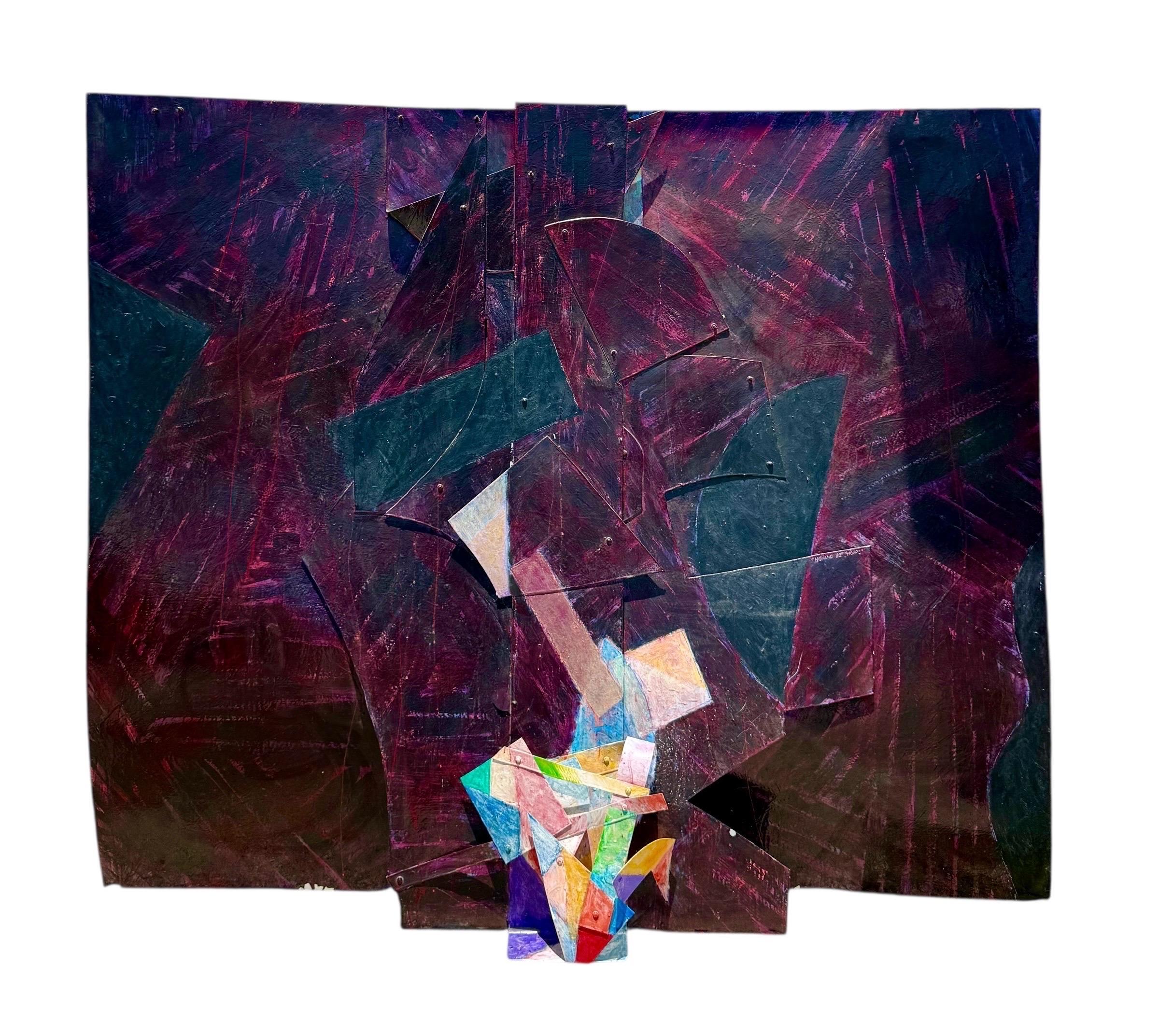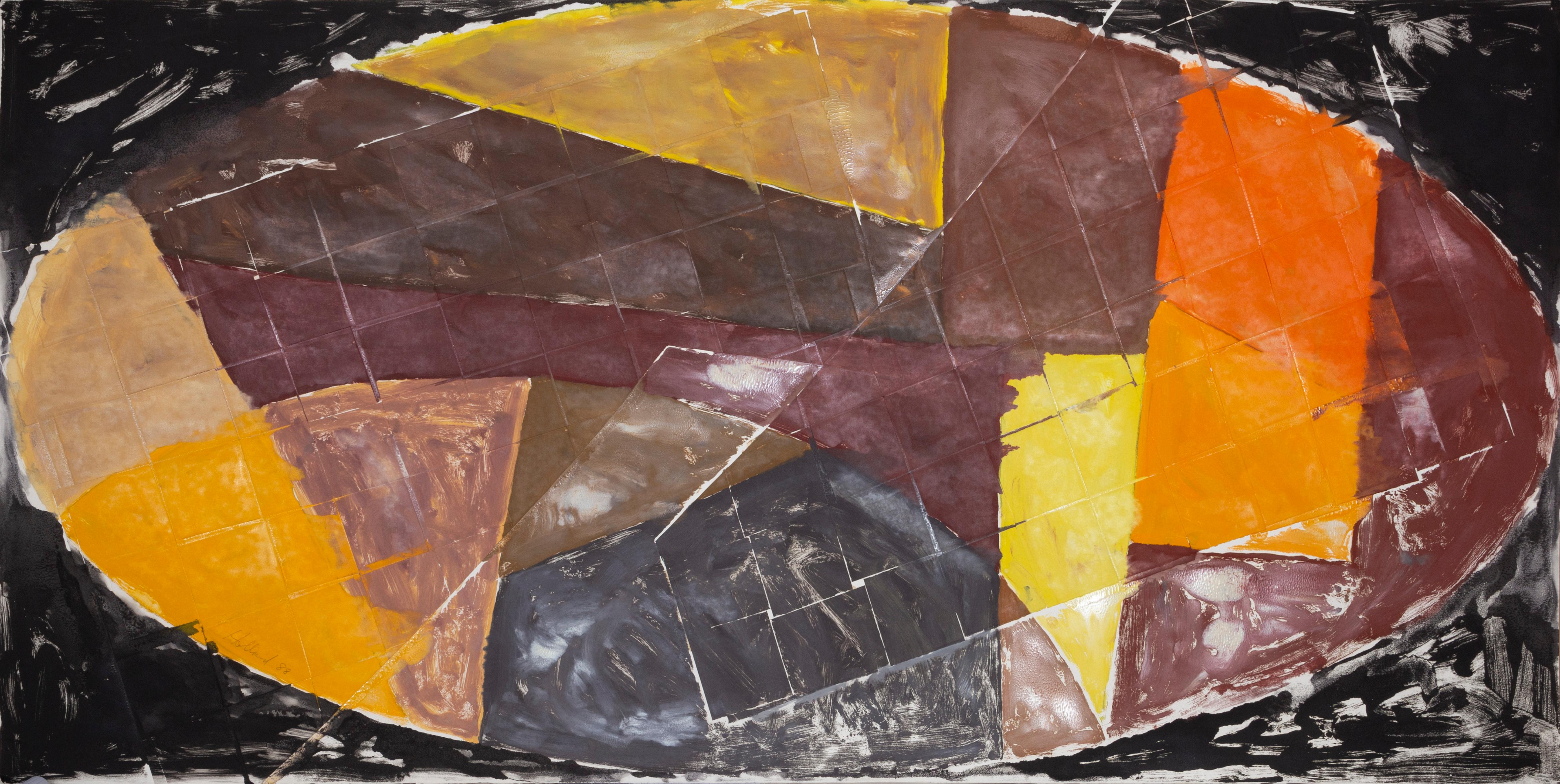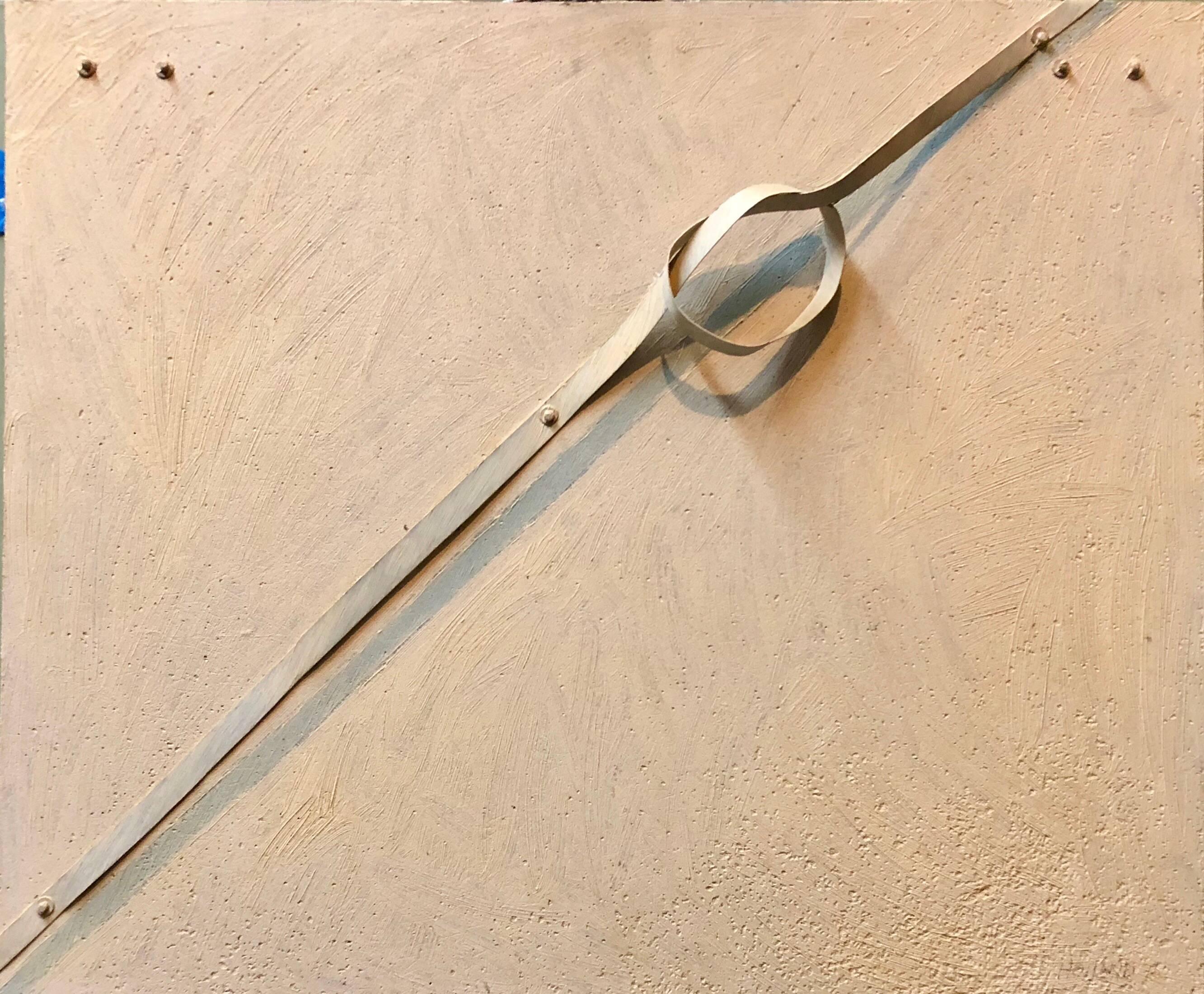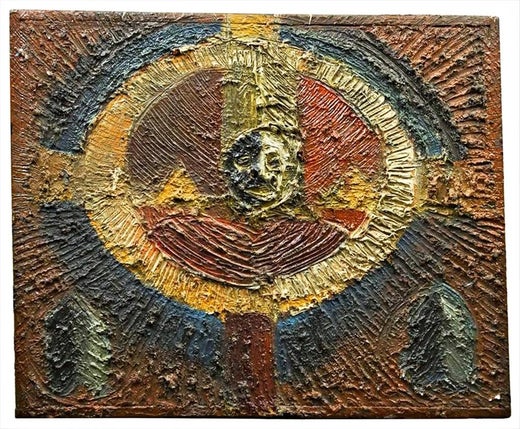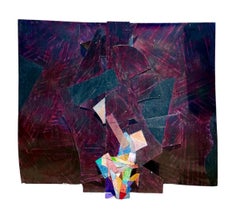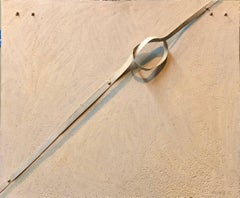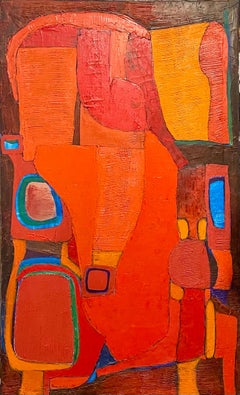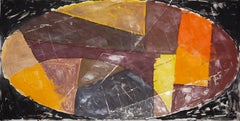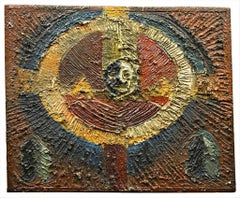Items Similar to Very Large Constructed Abstract Mixed Media Painting Wall Sculpture Tom Holland
Want more images or videos?
Request additional images or videos from the seller
1 of 21
Tom HollandVery Large Constructed Abstract Mixed Media Painting Wall Sculpture Tom Holland1981
1981
$8,500
£6,566.79
€7,464.14
CA$12,085.80
A$13,154.85
CHF 6,929.33
MX$160,128.37
NOK 86,771.41
SEK 81,462.72
DKK 55,742.56
About the Item
Tom Holland (American, b. 1936)
Rivero
fiberglass and aluminum with epoxy paint
Mixed Media Wall Sculpture
1981, hand signed and dated
Dimensions: 73 x 58 X 10 inches
Provenance: Charles Cowles Gallery
Tom Holland (born 1936 in Seattle, Washington, United States) is an American visual artist. Holland is known for creating a style of art that may use fiberglass (or fibreglass), aluminum (or aluminium), epoxy paint, plywood, beads, oil paint, palette knives, marble, copper, paper, and clay. For clay he uses watercolor, acrylic urethane, and ceramic glazes.
Holland began his formal art education at the University of California at Berkeley, where he was influenced by David Park who was a member of the art faculty. Other artists, among them Richard Diebenkorn and Elmer Bischoff, working at this time in Berkeley, contributed to the development of Holland's artistic and personal style as a young student. His work with grommets and 3D dimensionality pre dates Frank Stella, He has exhibited at the San Francisco Museum with Mel Ramos Tony Delap, Roy De Forest, Manuel Neri, Nathan Oliveira, Wayne Thiebaud, and William Wiley.
Following his time at Cal, he travelled to Santiago, Chile, as a Fulbright Grant recipient.
His beginning as a painter was labeled "funky". It wasn't until Holland began to work with aluminum that he achieved critical acclaim. His work has been described as taking inspiration from Abstract Expressionist art, Cubism, Futurism, and Constructivism, and he has been called one of California's most important contemporary artists and was featured in Art in the San Francisco Bay Area, 1945–1980: An Illustrated History.
Holland works primarily with fiberglass and aluminum to create free-standing and wall installations, a style that has been said to encompass Abstract Expressionism. He creates his art by riveting metal to the fiberglass or aluminum, then using epoxy paint to add other elements to the piece which add depth, light, and color. His work has been labeled exhilarating and visually challenging, playing games and distorting the three-dimensional space. His work has been described as taking inspiration from Cubism, Futurism, and Constructivism, and he has been called one of California's most important contemporary artists and was featured in Art in the San Francisco Bay Area, 1945–1980: An Illustrated History. His work has been labeled exhilarating and visually challenging, playing games and distorting the three dimensional space.
In addition to developing his own work, Holland has also served as a faculty member at the San Francisco Art Institute, UCLA, and UC Berkeley. He retired from teaching in order to paint full time in his downtown Berkeley studio. Beyond his larger sculptural pieces, Holland occasionally cuts and bends paper, fiberglass or aluminum to make small figures such as heads or animals which are playful exercises with color, form and materials. He contracts with a potter to make ceramic plates which he paints using images inspired by the landscape and has done a series of paintings often etching on thin copper sheets. His work was chosen by John Elderfield of the Museum of Modern Art in New York City for a show of work on paper which encouraged Holland to continue exercising this creative form. He also makes lithographs and has made prints with Cirrus Editions, Nuristani Prints and Crown Point Press. He works on marble, copper, paper, and clay and uses watercolor, acrylic urethane and ceramic glazes.
Holland is currently represented by galleries in Dallas, Santa Fe and San Francisco and his prints are with Crown Point Press in San Francisco and Cirrus Editions in Los Angeles.
Awards
1959 : Fulbright Fellowship
1975–1976 : National Endowment for the Arts Sculpture Grant
1980 : Guggenheim Fellowship
Solo exhibitions
1966 : Nicholas Wilder Gallery, Los Angeles
1970 : Neuendorf Gallery, Hamburg
1972 : Felicity Samuel Gallery, London
1972 : San Francisco Museum of Modern Art, San Francisco
1980 : James Corcoran Gallery – Santa Monica
1982 : Corcoran Gallery
1983 : Bank of America Galleries, Santa Monica
1989 : Persons and Lindell Gallery, Helsinki
1994 : San Jose Museum of Art, San Jose
1995 : Triton Museum, Silicon Valley
2002 : John Berggruen Gallery, San Francisco
2017 : Bivins Gallery
Group exhibitions
1973 : Whitney Museum of American Art, New York
1965 : University of Texas, University Art Museum, Austin
1969 : Corcoran Gallery
1970 : Museum of Modern Art, New York
1977 : Watson/de Nagy & Company
1981 : Museum of Modern Art, New York
1984 : San Francisco Museum of Modern Art, San Francisco
1996 : Los Angeles County Museum, of Art, Los Angeles
2004 : The National Academy, New York
2005 : Tucson Museum of Art
2017 : Bivins Gallery, Dallas
Notable collections
Anderson Collection
Berkeley Art Museum
Brooklyn Museum
Charles Schwab Company
Chicago Art Institute
Cleveland Center for Contemporary Art
Denver Art Museum
Di Rosa Collections
Duker Collection
Federal Reserve Bank, San Francisco
Los Angeles County Museum* Mayfield Fund
Museum of Modern Art, New York
Oakland Museum of California
The Official Residence of the United States Ambassador to Switzerland
Palm Springs Desert Museum
San Francisco Art Institute
San Francisco Museum of Modern Art
The Santa Barbara Museum of Art Collection
Seattle Art Museum
Solomon R. Guggenheim Museum
Walker Art Center, Minneapolis
Whitney Museum of American Art
- Creator:Tom Holland (1936, American)
- Creation Year:1981
- Dimensions:Height: 73 in (185.42 cm)Width: 58 in (147.32 cm)Depth: 10 in (25.4 cm)
- Medium:
- Movement & Style:
- Period:
- Condition:some bowing to fiberglass (inherent to material). possibly intended that way and a result of technique. some very minor chips. Please see photos.
- Gallery Location:Surfside, FL
- Reference Number:1stDibs: LU38216470742
Tom Holland
Tom Holland was born on June 15, 1936, in Seattle. Holland's work is represented in many public collections such as the Art Institute of Chicago, The Solomon R. Guggenheim Museum, the Hirshhorn Museum and Sculpture Garden, the Museum of Modern Art in New York, the San Francisco Museum of Modern Art and the Whitney Museum of American Art. He currently resides in the bay area, where he continues to create art.
About the Seller
4.9
Platinum Seller
Premium sellers with a 4.7+ rating and 24-hour response times
Established in 1995
1stDibs seller since 2014
1,823 sales on 1stDibs
Typical response time: 1 hour
- ShippingRetrieving quote...Shipping from: Surfside, FL
- Return Policy
Authenticity Guarantee
In the unlikely event there’s an issue with an item’s authenticity, contact us within 1 year for a full refund. DetailsMoney-Back Guarantee
If your item is not as described, is damaged in transit, or does not arrive, contact us within 7 days for a full refund. Details24-Hour Cancellation
You have a 24-hour grace period in which to reconsider your purchase, with no questions asked.Vetted Professional Sellers
Our world-class sellers must adhere to strict standards for service and quality, maintaining the integrity of our listings.Price-Match Guarantee
If you find that a seller listed the same item for a lower price elsewhere, we’ll match it.Trusted Global Delivery
Our best-in-class carrier network provides specialized shipping options worldwide, including custom delivery.More From This Seller
View AllVery Large Constructed Abstract Mixed Media Painting Wall Sculpture Tom Holland
By Tom Holland
Located in Surfside, FL
Tom Holland (American, b. 1936)
Hopps
fiberglass and aluminum with epoxy paint
Mixed Media Wall Sculpture
1982, hand signed and dated
Dimensions: 65.5 X 78 X 10 inches
Tom Hollan...
Category
1980s Contemporary Abstract Paintings
Materials
Metal
BILLY, 1975 Constructed Mixed Media Painting, Wall Sculpture
By Tom Holland
Located in Surfside, FL
BILLY, 1975, epoxy painting on riveted fiberglass and aluminum, titled signed and dated verso . Gallery label from Obelisk Gallery, Boston, MA
Tom Holland (born 1936 in Seattle, Was...
Category
1970s Contemporary Abstract Paintings
Materials
Metal
Large Modernist Abstract Painting (1of 2 available)
By Gregg Robinson
Located in Surfside, FL
Gregg Robinson, American (born 1948) "Cipher Bar 20" Oil on Canvasboard Panel. Artist signed, title and dated 1990 far right. Very minor rubbing to paint. Panel measures 15-1/4" H x 63-1/2" W, frame measures 24-1/4" H x 72-1/4"
GREGG ROBINSON
The universe of visual art encompasses a huge spectrum of motivation and means of expression. Examples range from the most syrupy sentimentality to extremes of moral and intellectual confrontation. For me, the creative process is, on the simplest level, an aesthetic puzzle. Elements of the puzzle include contrast, color, visual texture, graphic pattern, and in some recent work, a simple cryptic symbolism.
I have never been particularly interested in lyric or pictorial content, and though some of my work does contain undeniable spatial illusion, even that tends to be a by-product rather than a goal of the primary pursuit: the balance of light and dark, pure color and organic neutrals, energy and calm, strong pattern and subtle field. Having grown up in an environment of contemporary architecture, I have always valued the classic modern synthesis of form and function exemplified by the Bauhaus movement of the early 20th century. Hence, the simplest solutions are often the most satisfying. Obviously, the modernist ideal of efficiency in form and function requires that method of execution be as well adapted to the aesthetic goal as the visual language itself.
The media before you is the result of many years of experimentation that came to its current form in early 1992. I work with dry pigment over a plaster surface. My tools are broad knives, sponges, rags and masking. The finish is a high gloss alkyd resin.
CORPORATE COLLECTIONS:
Allstate Insurance
NBC Productions
Alaska...
Category
1990s Contemporary Abstract Paintings
Materials
Canvas, Mixed Media, Oil, Board
Large Abstract Biomorphic Spanish Bold Modern Oil Painting Angel Ponce de Leon
Located in Surfside, FL
Abstracto Rojo (Red Abstract)
Hand signed and dated 1966
Angel Ponce de León (Spanish-French, 1925-)
The artist, apparently still living in his ...
Category
1960s Abstract Abstract Paintings
Materials
Canvas, Oil
Italian Modernist Abstract Sculpture Painting Shaped Canvas Brutalist Collage
By Max Marra
Located in Surfside, FL
Signed, dated, and titled "MAX MARRA XXX 2002 verso.
Mixed media sculpture painting including acrylic, ink, cord, and wax on shaped canvas, 20 3/4 x 24 in., unframed.
Ho viaggiato ...
Category
Early 2000s Modern Abstract Paintings
Materials
Cord, Ink, Mixed Media, Wax, Acrylic
Abstract mixed Media Collage Vibrant Painting
By Armand Szainer
Located in Surfside, FL
Genre: Contemporary
Subject: Abstract
Medium: Mixed Media
Surface: Canvas
Country: United States
Dimensions: 32.25" x 24.25"
commissions for movie advertisements, stage sets...
Category
20th Century Abstract Expressionist Abstract Paintings
Materials
Mixed Media
You May Also Like
Garner Tullis, Large Painting with Collage by Tom Holland
By Tom Holland
Located in Long Island City, NY
Artist: Tom Holland
Title: Garner Tullis
Year: 1988
Medium: Acrylic on paper, signed and dated in pencil
Paper Size: 42 x 82 in. (106.68 x 208.28 cm)
Category
1980s Abstract Expressionist Abstract Paintings
Materials
Acrylic, Archival Paper
Large Sculptural Cubist Abstract Painting
Located in Houston, TX
Large colorful sculptural abstract painting by Texas artist Patrick Cronin. Painted with acrylic paint and mixed media, dated 1986.
Category
1950s Abstract Abstract Paintings
Materials
Mixed Media
Signed Mid Century Modern abstract painting, de-accessioned from Oakland Museum
By Tom Holland
Located in New York, NY
TOM HOLLAND
Untitled Mid Century Modern painting (Oakland Museum De-Accession), 1963
Oil on Canvas
16 1/2 × 20 1/2 x .5 inches
Unique
Signed and dated on the back of the frame
Frame...
Category
1960s Abstract Abstract Paintings
Materials
Canvas, Oil, Permanent Marker
Large Abstract and Collage Painting on Canvas by Dan Teis
By Dan Teis
Located in Long Island City, NY
Artist: Dan Teis, American (1925 - 2002)
Title: Floating Abstract Shapes on Brown
Year: 1980
Medium: Oil on Canvas signed l.r.
Size: 73.5 x 55.5 in. (186.69 x 140.97 cm)
Category
1980s Abstract Abstract Paintings
Materials
Canvas, Acrylic
Mégalithes. Large Scale Abstract Expressionist Mixed Media Wall Sculpture
Located in Cotignac, FR
Large Abstract Expressionist mixed media from the 'Megaliths' series by French artist Joseph Alessandri. Signed to the front bottom left side and dated 99 and signed with a reference...
Category
Late 20th Century Abstract Geometric Mixed Media
Materials
Metal
$3,601 Sale Price
27% Off
Mixed Media Painting by Steven Colucci
By John Byard
Located in New York City, NY
Steven Colucci’s iconoclastic approach to performance and the visual arts
have not only long blurred the boundaries between these disciplines, but have
challenged its most basic assumptions. The title of this show references a
most rudimentary dance move --the plié --and our assumptions of what to
expect in relation to this. Also the suggestion that we can simply press a
button and a preconceived outcome will be courteously delivered --a form of
prefabricated belief in itself. Steven Colucci’s artwork turns such basic
assumptions on their heads. Finding early inspiration in the New York school
of abstract expressionists such as Jackson Pollock with his action painting,
and then further by his professor --a then young Vito Acconci while studying
at the School of Visual Arts, Steven Colucci went from exploring the raw
existentialist experimentation of New York’s early painting and performance
scenes, to investigating the other end of the spectrum --the rigorously
measured and controlled disciplines of pantomime and ballet; studying in
Paris under the tutelage of world-famous Marcelle Marceau, and engaging
with the concepts of dramatic movement pioneer and intellectual Etienne
Decroux. Colucci has explained the difference between the extremes of
pantomime and dance as being that pantomime forces movement via an
internal capacity --movement directed inward to the core of one’s self --a
source requiring extreme mental and physical control. Dance by contrast is
an external expression; likewise requiring great precision, although instead
an extension of self or sentiment that projects outwardly. While such
historical ‘movement’ disciplines serve as foundation blocks for Steven’s
artistic explorations, it is the realm in between that he is best known for his
contributions --an experimental movement and performance art that
simultaneously honors, yet defiantly refutes tradition; rejecting a
compartmentalization regarding art and movement, yet incorporating its
elements into his own brand of experimental pastiche. Colucci’s performance
works manifest as eerily candy-coated and familiar, yet incorporate
unexpected jags of the uncanny throughout, exploiting a sort of coulrophobia
in the viewer; an exploration of a cumulative artifice that binds human
nature against its darker tendencies; highlighting traditions of artifice itself -
the fabricated systemologies that necessitate compartmentalization in the
first place.
It is evident in Steven Colucci’s paintings that he has established a uniquely
distinctive pictorial vocabulary; a strong allusion to --or moreso an extension
of --his performance works. Colucci’s paintings depict a sort of kinetic
spectrum, or as he refers to them “a technical expression of physicality and
movement”. Whereas the French performance and visual artist Yves Klein
used the human body as a “paint brush” to demarcate his paintings and
thereby signify a residue of performance, Colucci’s utilization of nonsensical
numbers and number sequences taken from dance scores, as well as heat-
induced image abstraction depicting traces of movement likewise inform his
vocabulary. In the strand of the choreographed, yet incorporating moments of
chance, Colucci’s paintings represent an over arching structure; a rhythm of
being and state, yet detail erratic moments --moments that denote a certain
frailty --the edge of human stamina. Colucci’s paintings dually represent a
form of gestural abstraction --and also the reverse of this --a unique
anthropomorphization of varying states of movement – that sometimes
present as a temperature induced color field, at others are juxtapositions of
movement and depictions of physical gestural images themselves. Colucci’s
use of vernacular and found materials such as cardboard evoke his mastery of
set design, and also reference a sort of collective experience of urbanity and
the ephemeral. Such contradictions seem to permeate not only Steven
Colucci’s artwork, but also are reflected in his person – one who grew up in
New York’s Bronx during a zeitgeist moment in visual and performing arts in
the 1960s – one who shifts with ease from happenings and experiments in
New York City, to his meticulously choreographed megaproductions at
Lincoln Center or starring in the Paris ballet...
Category
2010s Paintings
Materials
Acrylic
